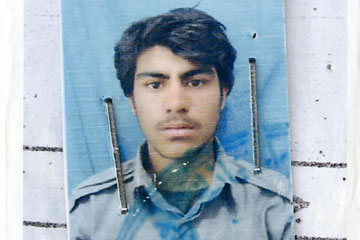
This photocopy of an image of Abdul Razaq, the killer of the three Marines, was given to the writer by a Marine in Helmand.
(11 of 12)
In any case, Special Operations Marines--volunteers, each--tend to be men of certainty. They have to be. As Manoukian once told a fellow officer, "If your heart is not in it, you won't believe in what you are doing. You won't handle business." By all accounts, the Marines who died that night in August--Ryan Jeschke, Sky Mote and Matt Manoukian, or Captain Haider--were doing their best to handle business.
After the attack, Asadullah was detained for 27 days. He spent many of these in a cell with Taliban fighters he had captured with the Marines he was suspected of killing. He has since has been cleared of charges but remains unable to rejoin the police, which is his wish. On the night of the attack, he fled the base because he thought the Marines would kill him. This made him suspect, though he turned himself in the next day--and others shared his fear at the time. He and another eyewitness independently described indiscriminate fire following the murders from the Marine side of the base through a door into the Afghan side.
In private, the Marines dispute this--but without official comment it remains a problematic part of the story. After the Marines denied my request to embed with Team 8133, I asked to speak with the Marine who had survived the shooting or, barring that, with anyone who could provide an American account of what happened that night. I made this request--formally and informally, by e-mail, phone and in person--to a variety of Marine, ISAF and U.S. embassy personnel, often providing detailed context. Face to face, everyone I spoke with was sympathetic.
Responses were slow, however, and I often followed up before anyone got back to me. In early January, I received an e-mail from Colonel Thomas Collins, one of ISAF's top public-affairs officers: "I made the case, but without so much as even a hint of enthusiasm, I could not take your request higher. Sorry." Several weeks later, with regard to my follow-up, he sent this: "The official account would be the investigation itself, for which you have already submitted a FOIA request. Beyond that, I have nothing to offer as far as the official or unofficial account of what happened."
According to foia.gov "the standard time limit" established by the Freedom of Information Act is approximately one month, but "when an agency requires an extension of time, it will notify you in writing." Having received no such notification a month after filing, I followed up at Centcom, which referred me to Marine Special Operations Command. That office has not responded to further inquiries. Perhaps their assessment is that disclosing information would jeopardize operational security. A greater danger, however, might be that the specifics of the shooting are the least important part of a larger story having to do with transparency, strategy and what is possible--and what is not--even for America's elite special forces.
